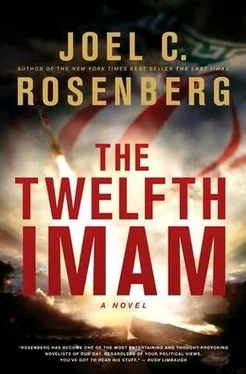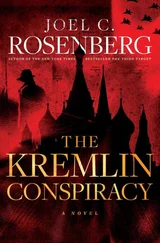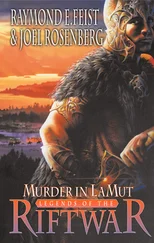“Why not?”
“I don’t know. I just can’t.” Then she whispered, “Please, David, tell me the story.”
He said nothing but felt strangely electrified to be so close to her.
“Please,” she whispered. “It would really mean the world to me.”
David swallowed hard. He didn’t trust himself alone with her just then. A storm of emotions was erupting inside him. He needed space-a walk, a swim, some kind of change of pace and setting.
“I can’t, Marseille,” he said. “I wish I could. But it’s not my place.”
There was a long, painful silence.
“Fine,” she said, letting go of him and looking away. “Never mind.”
“Marseille, I’m sorry. I’m not trying to be hurtful to you; it’s just-”
“Forget it. It’s no big deal.”
He reached for her hand again, but she drew it away. He was hoping desperately that the chemistry in the room would change back. But it did not.
For the rest of Monday, Marseille was distant and aloof.
She spent most of her time alone, while David hung out with his father.
That evening as the sun began to set over the glassy waters, David looked up from a book to see Mike Calveto, one of Saeed’s friends, sidling up to Marseille as she was standing by the shore. David couldn’t hear what Mike said, but he saw him try to grab her from behind and kiss her on the ear. What was he doing? Was he crazy? Marseille looked shocked and a little scared. David was on his feet instantly, sprinting to her side. Mike was embarrassed by the rebuff but tried to laugh it off. No one else saw the incident, and none of them wanted to escalate the matter by getting their fathers involved. But when Mike finally went his way, Marseille asked David to stay with her.
“You’re not mad at me anymore?” David asked.
“I am still mad at you, but I don’t have any choice,” she replied. “At least you’re trying to be a gentleman.”
When it was clear that they were alone, she slipped her arm through his and they began to walk. Her touch was intoxicating.
“He means well,” David sputtered.
“No, he doesn’t,” Marseille said.
David thought about that, then conceded, “No, you’re right. He doesn’t.” At least the friction between them seemed to have disappeared.
They walked to the end of the dock, dangled their feet over the edge, and talked until after sundown.
It was nearly dark when they heard Marseille’s father calling them for supper. Reluctantly, they stood and turned to head back toward the camp. Abruptly Marseille leaned forward and kissed him. It lasted only a moment, but it was a first for David, and for the rest of the evening he could still feel her soft lips on his and the warmth of her body nestled up against his own.

“Rise and shine, buddy.”
David heard his father’s kind voice and felt his father’s hands gently shaking him awake. But it was early. Way too early-and still dark and cold. A quick glance at his watch told David it was barely six in the morning. He rolled over in his sleeping bag and put his pillow over his head.
“Just let me sleep,” he moaned.
“Sorry, young man,” his father replied, “but we’ve got to pack up, break camp, and get moving so we’re ready before the planes get here.”
Two hours later, they were ready.
The cabins had been swept. The dishes had been cleaned. The sleeping bags had been rolled up. The fire had been covered with sand. They were all down by the dock, bags packed, awaiting the floatplanes. There had been little talking. Most were too groggy for that. But when they were sure no one was looking, David and Marseille would occasionally steal a glance at one another and smile, savoring their moment on the dock the night before.
And yet, a sadness was beginning to creep into David’s spirit. It was born of the sudden realization that their time together over the past four days was destined to burn away forever like the fog as the sun came up. He lived in Syracuse. She lived in Spring Lake, a little town on the Jersey Shore, hundreds of miles away. Neither of them could drive. How, then, could they date? These, David realized, were likely to be their last minutes together for quite some time.
The still, brisk midmorning air was quiet. Too quiet. The planes should have been there by now. David looked at his watch again-10:15. He couldn’t believe how quickly time was slipping away from them. This wasn’t good. Their train would be pulling out of Clova at 11:20. But where were the floatplanes?
The dads were growing anxious. There was a low hum about the camp as the murmuring against Larry McKenzie and his fellow pilots grew. David’s father, he remembered, had to perform an open-heart surgery at ten in the morning the following day. But if they missed the train to Montreal, they’d never make their flight to Philadelphia or their connection to Syracuse.
Finally one of the fathers asked what everyone else was thinking. “So if we miss this train, when’s the next one?”
“I don’t know,” another father confessed. “We’ve been doing this for, what, six years, and we’ve never missed the train yet.”
All eyes turned to Dr. Shirazi.
“I’m sure everything will be fine,” he insisted.
“Absolutely,” Charlie Harper chimed in.
“But what if it’s not?” one of the dads asked. “What if McKenzie doesn’t show in the next two minutes? What then?”
“I’m sure they’ll be here any second,” Dr. Shirazi insisted as David strained to see any sign of the de Havillands on the horizon. But there were none to be found.
David whispered to his father, “Dad, when is the next train?”
His father said nothing. Several minutes went by. David wondered if his father had actually heard him, but David saw his clenched jaw and knew that he had.
Then his father whispered back, “Thursday.”
“Thursday?”
David hadn’t meant to say it so loud-or at all. It had been an involuntary reaction, and the flash of anger in his father’s eyes didn’t help any.
“Tell me he’s kidding,” one of the fathers insisted.
“I’m afraid he’s not,” Dr. Shirazi conceded.
“Thursday?” another demanded, cursing. “How is that possible? I’ve got patients waiting for me. I can’t be here until Thursday!”
Panic and anger were a volatile cocktail, and these men swallowed it whole. The fathers gathered around Dr. Shirazi, all angrily explaining their highly important and finely crafted schedules to him-as though there was anything he could do. David shrank back from the group. He felt terrible for his father. It wasn’t his fault. It was McKenzie’s.
Where were the pilots? How could they just strand them all there? Was it engine trouble? Why didn’t they send other planes? And what exactly were they supposed to do? They had no cell phone coverage up here, no radios, no satellite phone. They had no way to contact civilization at all.
Most of the men-with the exception of Charlie Harper-were now threatening to sue McKenzie Air Expeditions for every red Canadian cent they had. “We’re going to own that company!” one of them vowed.
But the threats did little good. As the hours passed, there were still no floatplanes. By two that afternoon, everyone was not only anxious but hungry as well. They were sick of fish by now, and there wasn’t a lot of extra food. They snacked on leftover candy bars and some unfinished bags of gorp and tried to figure out what to do. Should they just sit tight and keep waiting or unpack and set up their camp again?
Читать дальше













